#jewish folk practices
Text
… [Medieval] witchcraft and sorcery were based upon a perverted worship of Satan, according to popular belief, and individual warlocks were supposed consciously to accept the suzerainty of the Power of Evil and to operate through an appeal to his aid. Jewish magic, to the contrary, functioned within the framework of the Jewish religion, which naturally excluded any such association, real or fancied, with the arch-opponent of God. This reputed central feature of European magic, from which it derived its special character, was entirely foreign to the Jewish mentality, not only on theological grounds, but even more on folkloristic, for the figure of Satan as a distinct personality was very faint, almost non-existent, in Jewish folklore. The entire literature does not disclose a single instance of a magical act which depended upon submission to the devil himself, or his intercession, for its execution.
Joshua Trachtenberg, Jewish Magic and Superstition: A Study in Folk Religion; The Truth Behind the Legend: Jewish Magic
#jewish magic and superstition#joshua trachtenberg#jewish magic and superstition: a study in folk religion#the truth behind the legend: jewish magic#jewish magic#jewish folklore#jewish folk practices
33 notes
·
View notes
Text
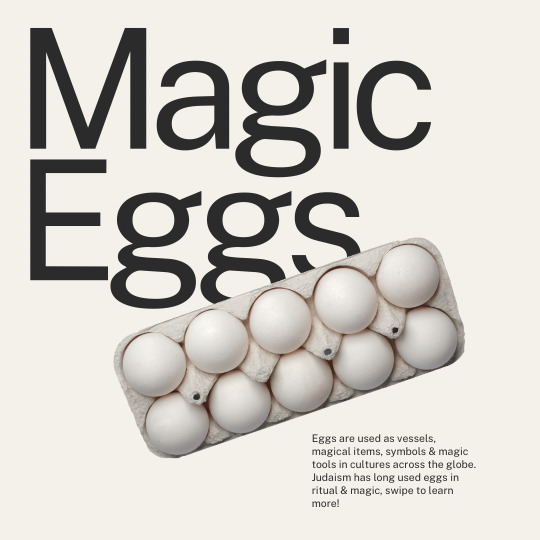
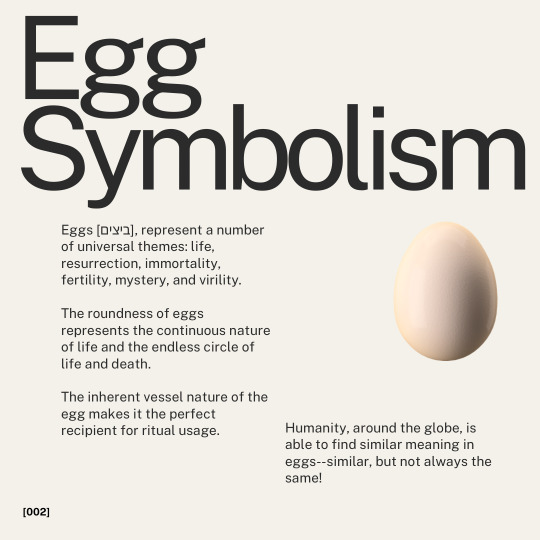

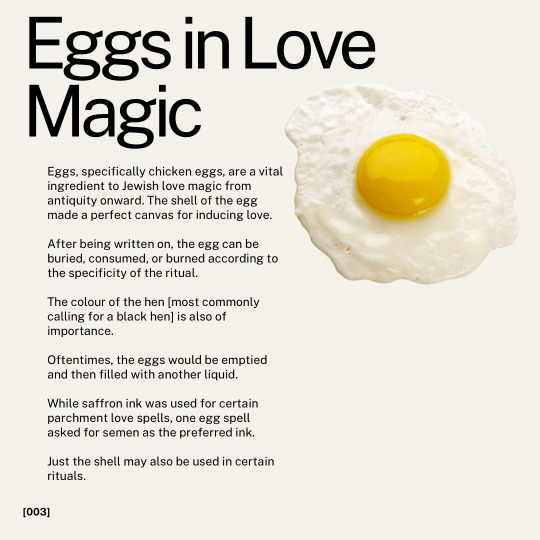




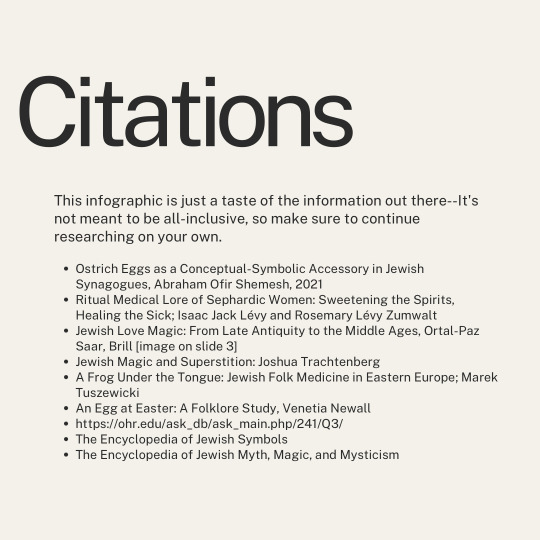
There’s magic surrounding us and there is nothing quite like learning about how our ancestors turned ‘every day’ ingredients into integral parts of ritual. From fertility and love to sewing discord and creating hate, eggs have been vessels for magic in Judaism for centuries. Learn about the various forms of usage of eggs in folk magic and practices in Jewish communities.
But Judaism isn’t alone in utilizing eggs—Certain egg symbolism transcends the borders of culture and are nearly global concepts. Eggs as symbols of resurrection, immortality, life, and rebirth: these are cross-cultural beliefs that exist in many different communities and cultures, so you may see things that resonate with you, even if you’re not Jewish!
Have you witnessed or performed magic with an egg? What rituals with eggs exist in your community? And, of course, do you dip your eggs in ashes?
#jewish#jewitches#judaism#jumblr#jewitch#jewish magic#witchcraft#magic#eggs#egg#egg magic#folk magic#folk practice#folk tradition#witchblr
281 notes
·
View notes
Text
why do culturally christian americans think it's okay to rewrite the mythology of cultures that have nothing to do with them to make them fit their ideals
#i see this done SO much to jewish culture both from actual practicing christians and pagans & atheists that were raised christian#like they seem to have that same belief of superiority over judaism and other religions more broadly#like folks appropriating lilith to girlbossify her#or rewriting every single greek myth again to girlbossify or generally give them modern politics & morals#for a while people were also doing it with like. old european fairy tales.#like remember that post that was like what if red riding hood was hijabi? like bro. have you considered maybe looking into actual#traditional muslim stories rather than slapping a muslim character over another culture and calling it a muslim story?#and there were various replies to that post. and these were clearly people with disney brainrot who wanted more diverse stories#but weren't willing to actually go look for them and would have rather slapped a different culture on a character who is still#fundamentally european. like. idk this is a whole thing.#like i kinda feel this way even towards disney's princess & the frog. there was an actual african version of that story. don't get me wrong#i liked it. and i don't have any say on whether or not it's good rep. because i'm not african american#like i like that it's an adaptation put into a different setting and different time period. but there was still already an african version#of the fairy tale. am i making sense#i don't even know if this has a name. idk if it can be classified as cultural appropriation. it's similar?#anyway. i hate this whole phenomenon.
21 notes
·
View notes
Text
today is my grandpa’s yahrzeit and i was looking forward to going to services to hear his name read (and to say a short something about him per my shul’s custom) but i just got a migraine :(
i should hopefully still be okay to zoom in but it’s not quite the same. this sucks 😣
#i was also looking forward to going to service in general#at least the zoom folks are super chill#small part of me wonders if this is my grandpa’s interaction to keep me from talking about him at the synagogue#too bad old man (affectionate)! your name is getting read whether i’m there or not#(he was jewish but never forgave g-d for the holocaust and stopped practicing when he was around 19 or 20)#jumblr
6 notes
·
View notes
Text
If you don't like the fact that I'm a broken-maternal Jewish descendant looking to Convert / Reconnect / Return (when finally given the opportunity), while currently maintaining a Jewish adjacent Pagan syncretic faith system + studying (typically Slavic and Mystic focused) Jewish Tradition / Religion / History as preparation and practicing my largely Christian (Mormon and Pennsylvanian Fancy Dutch) folk traditions in the meantime (because I don't currently have that opportunity) ... There's the door 🤷♀️ Don't let it hit you.
#All roads back to our ancestors are unique#I really don't know what else to tell you#Personal#Noahidism#Jewish Studies#Pennsylvania Braucherei#Mormon Folk Healing#Traditional NeoWicca#German Folk Tradition#Slavic Folk Tradition#2023#A Direct Look At My Practice#Witchblr#Paganblr#Religion and Magic#Witches of Oklahoma#Oklahoma Witch#Oklahoma Witches#Pagans of Oklahoma#Oklahoma Pagan#Oklahoma Pagans#Wiccablr#ExMo#ExMormon
5 notes
·
View notes
Text
Not that any "ism" makes sense but antisemitism is wild to me because everything I learn about Judaism makes it seem like a pretty bitchin religion. Like they don't just go evangelize at whoever will vaguely accept their religion because they expect you to study the doctrine and religion deeply as part of the conversion process, they question and often debate parts of their theology and the merits of those things, and have a bunch of great food? I mean that's most of the issues I have with Christianity gone- a religion that won't just accept you at the drop of a hat because you said Jesus was cool and actually expects you to work and understand the religion? I'd say sign me up if I were the religious type but since I'm not just be nice to Jewish people they seem pretty awesome and their religion is pretty cool from what I see of it.
#winters ramblings#now OBVIOUSLY theres crappy jewish communities that aremt all hunky dory SURE. but it does appear by and large#that those communities are simply a result of a lot of people practicing one thing amd some being Weirdos about it#which is normal for any set of beliefs but for the most part like... you have to STUDY to be jewish#you JAVE to understand the Torah and the doctrine and how the religion works as a PART of conversion#thats actually cool as all get out and WAY better than the way im used to religion working. i could go on a killing spree tomorrow#and tell some rando christian in prison ive accepted jesus now and theyd be like 'cool i have no questions at all'#and its not to say killers cant reform and be christians its just that i dont think most DO THAT and no one is testing their knowledge#no one CARES if they say they like jesus amd god and idk i think the jewish folk have got it right#making people study and do REAL work to convert you know. i just think thats neat!!#i also heard somewhere but have not confirmed via any jewish people that you get denied three times before youre allowed to convert#which is EVEN BETTER to me it makes sure youre SERIOUS about being jewish and i think thats awesome!!
6 notes
·
View notes
Note
...What's Judeo-Dionysus theory?
Inside joke with some theology friends. A few years ago one of us found an article about how supposedly, there was a Interpretatio graeca of
Ancient Greek Guy Voice: "just met these Jewish folks, their religion involves a lot of wine and a god with a secret name, so we figure they worship Dionysus."
Now, none of us have actually been able to find this damn article, so we are pretty sure it's made up. In real life, Geeco-Roman religion and Judaism obviously interacted and syncretized, but we liked the idea that the interaction went something along the lines of:
Ancient Greek Guy: "Yoo I dig your weird cult of Dionysus."
Ancient Jewish Guy: "Yooo I dig your weird temple to Hashem."
Both of them are the same time: "Nice to meet someone who practices the same religion I do!" And they were best friends forever.
2K notes
·
View notes
Text
There are people in the witchcraft and pagan communities that really need to come to terms with the fact that pagan isn't the universal term for everything that isn't Christian (or Jewish, or Islamic). Hinduism isn't pagan. Buddhism isn't pagan. Hoodoo isn't pagan. African traditional religions aren't pagan. Many regional folk practices aren't truly pagan. The list goes on. It's more of an insult than an identity for some of these groups.
#witchblr#witchcraft#witch community#folk magic#serpentandthreads#witches of tumblr#pagan#paganism#paganblr
895 notes
·
View notes
Note
Is it ok to convert to Judaism so I can work with Lilith without breaking closed practice rules? Ive been told only jews can work with her. I don't believe in the Jewish god but I believe in Her and feel a connection.
For starters, I don’t know a ton about Lilith, aside from yes, only Jews can work with her. I’m also no expert on conversion, as I’m not a convert nor have I been heavily involved in someone else’s conversion. For this reason, I’d like other Jews who see this, especially converts, to add in their thoughts on the matter. My answer is going to be relatively vague considering the question at hand
That said, I would be very wary of someone converting specifically for Lilith, especially if they don’t believe in any tenets of Judaism. You don’t believe in our god, not all converts do. But there’s so much more to Judaism that conversion requires beyond that belief. My question for you, anon, is what other reasons do you have for converting? If it’s only for Lilith, you don’t actually want to be Jewish. You just want access to a closed practice. Ask yourself: am I ready to join a new culture and ethnicity? Am I ready to face antisemitism? Am I ready to analyze the antisemitic thoughts and beliefs I already have and uphold? Am I ready to support a new community? Am I interested in adopting other beliefs and practices of Judaism?
Talking to a rabbi will likely give you even more questions you need to ask before you can know if conversion is right for you. As I said, I know relatively little about conversion, and I know nothing about you, anon. If you feel serious about converting already, tell a rabbi exactly what you’ve sent me, and ask to have a more in-depth discussion on your interest in converting. After getting to know you more, they’ll likely have a better answer on whether converting because of Lilith is appropriate or not
At the end of the day, I cannot tell you whether conversion is right for you. What I can say is that it’s a serious decision that takes a lot of time and hard work. Converting to Judaism is not something a rabbi will let you do unless they’re certain you are ready for all that entails
@ folks in the notes, if you intend to respond to anon’s message, please be kind and assume they’re asking in good faith <3
569 notes
·
View notes
Text
There's something so vile and insidious about saying "happy x holiday to the Jewish people but not THESE specific Jewish people" as if a non Jew has any right to decide which Jewish folks get to be happy and celebrate their closed religious practice holidays and those who don't.
Either wish Jewish people a happy x holiday without the caveats or don't wish a happy x holiday at all.
321 notes
·
View notes
Text
It is reported that as early as the fourteenth century the ceremony called Hollekreisch was widely observed in Jewish circles in Germany. The Jewish boy receives his Hebrew name on the occasion of his circumcision; the girl child usually upon the first Sabbath after her birth. Since the earliest days of dispersion, however, Jews have also borne names drawn from the nomenclature of the people in whose midst they reside—names we may term secular or vulgar as distinguished from the Hebrew, the classical name. These secular cognomens usually correspond in one way or another to the Hebrew, whether as colloquial forms or translations, or related only by the sound or appearance. The ceremony of the Hollekreisch, which marked the bestowal of its secular name upon the child, comprised these features: the baby (or the cradle containing the baby) was lifted into the air three times, usually by the children especially invited for the occasion, and each time the name was shouted out by the guests in unison. Often this shouting followed a formula. In modern times such formulas as “Hollekreisch! What shall this child’s name be?” with the appropriate response, or “Holle! Holle! This child’s name shall be…,” have been employed. In the seventeenth century the custom of Hollekreisch was observed in naming boys and girls only in South Germany, while in Austria, Bohemia, Moravia and Poland it was not used for boys at all, and only rarely for girls.
Joshua Trachtenberg, Jewish Magic and Superstition: A Study in Folk Religion; The Powers of Evil: “Foreign” Demons
#jewish magic and superstition#joshua trachtenberg#jewish magic and superstition: a study in folk religion#the powers of evil#‘foreign’ demons#ashkenazim#the pale of settlement#jewish folk practices#jewish folk naming#hollekreisch
7 notes
·
View notes
Text
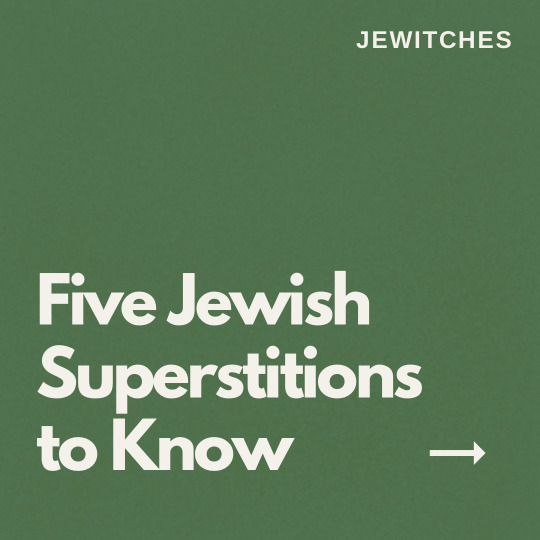





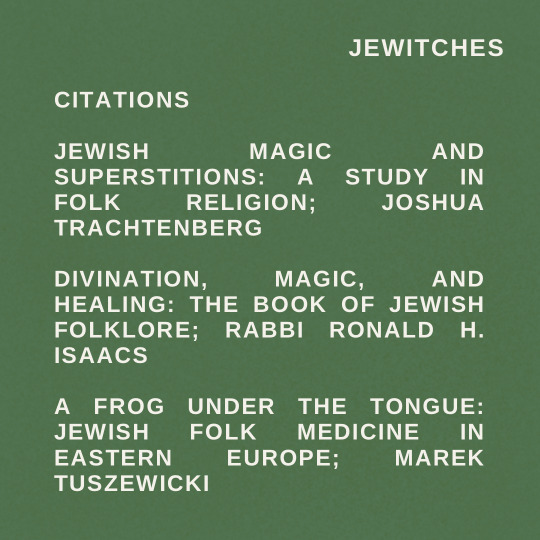
Make sure to follow our Instagram, @jewitches & check out our website for our brand new collection of Jewish inspired scented candles!
#jewish#jewitches#judaism#jumblr#jewitch#jewish magic#magic#witchblr#witchy#folklore#superstitous#superstition#folk practice#folk practitioner#demons#snails#candles
368 notes
·
View notes
Text
Folks, it's almost Easter. As a former evangelical pastor, I want to remind those who grew up in Christian culture (whether practising or not) that there is a lot of antisemitism within Christian practice, and most of us are pretty blind to it.
Around Easter is generally a time when Jewish people are harassed, threatened, or otherwise experience a rise in antisemitism. And this year is already extra awful for antisemitism and hate crimes against Jewish communities and individuals.
Don't be a antisemitic. Don't blame Jews for killing Jesus (wasn't that God's idea?). Don't host a "christian seder" (because that is a Jewish practice, not a Christian one). Don't assume that you are better than the Jewish people because you follow Jesus and they do not (because he's not their messiah). Don't blame your neighbours for things they have no control over.
#yes I used to be a licensed minister#there are many reasons I am not anymore#I am so tired of seeing antisemitism
130 notes
·
View notes
Text
A lot of things we think of as “religions” aren’t things you like… identify with.
Statistically speaking most peoples main experience with religion involves either Christianity or Islam. Two religions that require only sticking to their system and that anyone can convert to and have historically gone to war with people that do their religion slightly differently than they do
And while many other religions have similar situations, Sikhism aka Sikhi is another universalizing monotheistic religion for example but a lot of religions are either linked to one’s ethnicity or are entirely circumstantial.
A lot of people perform various religious or spiritual practices related to Taoism and follow their lives based on its philosophy but most of them wouldn’t consider themselves “Taoists” because to them that indicates specifically a Taoist priest or monk. Many people are specifically Buddhists but you can be a Buddhist and other things. Or you can follow various Buddhist religious and spiritual practices and not consider yourself to be a Buddhist. Shintoism and various other highly localized spiritual practices are in a similarly gray area. Anyone can follow Shinto practices or visit Shinto shrines but does that make it a universalizing religion? Idk. Most people that frequent Shinto shrines are probably also doing other things and don’t really care.
And even within exclusive religions things get blurry. A lot of old folk religion gods got reworked into being saints. I was raised by a person who follows zen Buddhism for their spiritual needs and as a result I still incorporate aspects of that practice into my life even though I’m a Christian. There’s atheist witches and Jewish omnists (and I know people who fit both of these examples) there’s people that are religious but not spiritual and there’s people that are spiritual but not religious and there’s people who if you ask them what their religion is they’ll just shrug and keep doing whatever.
Human spiritual practice and belief is… weird. It’s open to infinite types of possibilities. You can get as weird or as orthodox as you like with it in any direction. Results will be mixed.
1K notes
·
View notes
Note
Do you have any tips for when designing poc characters?? Like what not or to do, etc.
this is massively edited down to just keep the essentials. this isn't going to be as explicit as you were maybe wanting but saying "don't draw black characters this way, don't draw asian characters that way" isn't something i wanna do because it's not a good feeling to review a list of offensive design practices from a trauma standpoint and likely wouldn't be for any other people of color reading.
study from real photos.
really, any set of photos of people of color work but if you want a resource where people are not models nor actors that have been plucked up for their marketableness, here's a good site: Humanae — Angélica Dass (angelicadass.com) it's a photography collection associated with pantone to showcase diversity in shades of skin.
study faces within a group.
no two ppl look the same and character design is about showcasing this through certain features.
from these, study how much differently color works for melanated/non-white skin.
again, it's different for everyone even within groups. admittedly this is only something you'd need if you have a more in-depth or painterly style, but still. avoid grayish base skin tones. the aforementioned site is actually great for this.
LOOK INTO RACIST CARICATURES.
literally, people wouldn't find themselves "accidentally" slipping into racist designs if they just KNEW, explicitly knew, and internally acknowledged what people of color find offensive or what has been used against them in depictions of themselves.
yes, this includes looking at the old offensive cartoons, illustrations, etc. it's painful and uncomfortable and rough but it must be understood how these caricatures were a means of dehumanization and are mistakes to be learned from.
again, i'm not gonna list out exactly how not to depict a black person, an asian person, jewish person, latine, middle eastern, etc. etc. etc., because i feel these things should just be known, but if it's not, literally just be aware (or get aware) of the racial stigma faced by the group of people you are attempting to represent. put care into how you are depicting them.
BUT ALSO KEEP IN MIND: you shouldn't jump to default to white eurocentric features simply to "avoid" the any sort of backlash or offense that may be taken. because if you do so, a) in attempting to not be offensive, you're still perpetuating the upholding and favoring of white eurocentric features, and b) well, you're just stifling yourself.
designing characters of color REQUIRES acknowledgement of non-eurocentric features; hell, in the best cases, it's a celebration of these features.
as you would in replicating a style of architecture, a technique of painting, a depiction of a culture, you have to observe and become knowledgeable.
addendum: obviously, i'm not white, so i don't know the depths of how pervasive racism and white supremacy can be in a white person's personal life and upbringing; but i do know that racism and white supremacy are pervasive even (ESPECIALLY) in art, a much more tangible and permanent thing than a state of being, and knowing this, i do reserve a small margin of patience for white folks that are wanting to try to be in the know on this topic, especially younger people who have yet to unlearn certain things. if anyone reads this and thinks "well, it's not their responsibility or any person of color's to teach you these things," you're correct, but yknow. the effort's there, and trying's all we can do.
188 notes
·
View notes
Text
Nikaposting Pt 1: Crypto-Religion
This is the first of a series of posts about Nika & associated religious practice in the One Piece world. As I write and post the rest of the series, I’ll add links to this header.
Pt 2: Symbology & Syncretism | Pt 3: Joyboy was Shandian | Pt 4: Sun God Tropes
Enormous credit to @oriigami for being my discussion partner through all of this and having a substantial influence on the final product. Check out our ao3 series Joyful for a narrative rather than analytical take on the Nika tradition, and definitely go read her OP blog @kaizokuou-ni-naru for meta and translation fun facts.
-
The Nika Cult is a Crypto-Religion
Terminology note: I will be using cult in these posts in the sense of “cult of worship,” rather than in the modern pejorative sense. Additionally, I tend to use “tradition” rather than “religion” as a general term, because “religion” is a messy and difficult to define concept, while “tradition” is much more inclusive of traditional practices, folk beliefs, and cults of worship that may not be considered religions by Western scholarship.
Raise your hand if you saw Kuma’s church and Bible, concluded “oh, the Nika stuff is basically One Piece Christianity,” and moved on with your life.
It’s an easy assumption to make, and for all I know authorial intent may well stop there. I’m not Oda. I’ll never be able to guess what goes on behind those fish eyes of his. But a second look at the worldbuilding around both Nika and Christianity in One Piece brought me to a very different conclusion: that the Nika cult is a crypto-religion and is, in Kuma’s case, using the outward appearance of Christianity as camouflage.
First of all: We have ample evidence that Christianity (or some variation of it- I’m fascinated by the implied existence of such things as One Piece Jerusalem and the One Piece Council of Nicea) does exist in the One Piece world, and is both fairly widespread and quite legal. Flevance was pretty explicitly Catholic (Law went to church as a kid), Miss Monday and Mother Carmel masqueraded as nuns to imply harmlessness, many if not most of the graves shown in the series are crosses, whatever Usopp was on about with that exorcism equipment, and, yes, Kuma’s church and Bible.
Even mentioning the Nika cult, on the other hand, is grounds for the government to assassinate you with extreme prejudice.
A crypto-religion is what happens when a religion is suppressed to the point that its practice is grounds for exile, torture, and/or execution: Some people will convert. Some people will flee into exile. Some people will die. And some people will outwardly adopt the dominant religion, but will continue to practice their own traditions in secret; ie, they’ll create a crypto-religion.
One of the more famous examples of this is the post-Spanish Inquisition crypto-Jews of Spain and Portugal, who converted to Christianity in public but kept what Jewish traditions and rituals they could in private. To this day, descendants of these conversos whose families have been Catholic for centuries are discovering that their family tradition of lighting two candles on Friday or not eating pork on Saturday are in fact the legacy of a violently suppressed heritage. There are countless other examples of crypto-religions throughout history, both among Jews (my own personal field of knowledge) and among other traditions (for an example that would be known to Oda, the crypto-Christians of Japan).
There’s no way the Nika cult could have survived except in cryptic form. If it ever had physical infrastructure in the form of temples or pilgrimage sites, the government would have sought them out and demolished them long ago if they were not adequately disguised, especially in World Government member states like the Sorbet Kingdom. Likewise, anyone foolish enough to speak publicly about Nika will be summarily assassinated.
In fact, I have doubts that the Nika cult ever existed outside cryptic form, at least in a significant or long-lasting manner. It was specifically introduced as a slave tradition, likely nigh-exclusively oral, practiced in secret either from its inception—if Nika was a figure created by slaves, including the buccaneers—or for a very long time—if it was the cultural or ethnic tradition of the buccaneers, which spread from enslaved buccaneers to non-buccaneer slaves because Nika was a figure that resonated with them. I tend the favor the second option, but either has merit.
As @oriigami said when we were talking about this, Kuma has a church. Kuma has a bible. Kuma worships a god about whom absolutely nothing is written except in the oldest texts.
Additionally, I’ll expand on this more in pt 2 of this series, but the pendant Kuma leaves for Bonney, a large circular sapphire surrounded by eight smaller circular sapphires, matches the circular symbol inset into the crosses of his church. Bonney immediately identifies the pendant as a sun even though it really doesn’t look like one, and it can be surmised therefore that it’s a Nika amulet, and the sun with disconnected rays a Nika symbol. Following this read, and especially because this symbol occurs across the world in other contexts (see pt 2 for my thoughts on that), its presence in the church is a very careful bit of architectural sleight of hand on the part of whichever of Kuma’s ancestors built the place- echoing a very common practice of real-world crypto-religion adherents to mark the true nature of their allegiances and houses of worship in ways only those in the know might recognize.
And on a storytelling level, Kuma’s entire presence in the narrative and in the world has been a tragic saga of appearing to be one way until he’s revealed, again and again, to be the opposite. It makes thematic sense for him to be fooling the world about his faith as well!
#nikaposting#sun god nika#gear 5#opmeta#bartholomew kuma#meta tag#zephflix original#if i hadn't dropped out of college i'd be a religious studies major and this tag is how you know
89 notes
·
View notes